- START HERE!
- AP Literature Class Policies
- AP Lit College Board Resource Page
- Ms. B's Very Partial List of Passages Appearing on AP Lit Exams, 1970-2022
- The Seven Core Skills of AP Lit
- Teacher Notes: How to Teach AP Multiple Choice
- AP Multiple-Choice Question Stems
- Stable Wording Prompts for the FRQ Questions
- Multiple Choice: The Compass
- How to Write MC Questions - WRITING EXERCISE FOR STUDENTS
- The Command and Conquer Strategy
- Next Steps: Get Six Pieces of Evidence
- How to Read Literature Like a Professor
- Finding the MOWAW: Embrace the Weird
- All FRQ #1 Poetry Prompts 1970-2022 (With Poems)
- Skills 1 and 2: Character and Structure// Analyzing Cardinal Wolsey
- Skill 3: Figurative Language // Olive Senior, "Plants"
- Poetry 1 Quick Assessment: Write a Thesis Statement (Hardy and Collins)
- How to Teach Poetry II: Structure // Figurative Language // Imagery
- How to Teach Poetry III: Irony / Paradox / Conceit NOT DONE
- Writing the Poetry Analysis Essay (FRQ #1)
- MORE FRQ #1 Writing Practice, "The Landlady" // Understanding the AP Rubric, Continued
- Resource: How to Deal with a Difficult Poem
- Poetry: MC Focus on Shakespeare's Sonnet 60, "Like as the Waves..."
- Poetry: MC Focus on W.H. Auden, "Their Lonely Betters"
- Poetry: MC Focus on Robert Browning, "My Last Duchess"
- Student Assignment - Writing MC Questions for"Andrea del Sarto": Write Own AP Multiple-Choice Section
- Poetry Focus: Avoiding Cliché Themes in Billy Collins' "The History Teacher"
- Modernism: Poetry Speaks to Paintings
- Themes in Modernism: Alienation
- Poetry Focus: Secret Structure in "The Love Song of J. Alfred Prufrock"
- "The Author Uses Literary Techniques" Prufrock Essay
- Independent Reading for Poetry
- All AP FRQ #2 Prose Prompts, 1970-2022
- Character Analysis // Jackson, We Have Always Lived...
- Skill 2: Setting // Shirley Jackson / Charles Dickens
- Skill 3: Plot // Julio Cortazar
- Writing Literary Analysis
- How to Teach Short Fiction II: Ellis / Dickens / Jackson
- How to Teach the Prose Analysis Essay (FRQ #2)
- FRQ #2 Writing Assignment: How Not to Lean on Quotes (Dombey and Son)
- FRQ #2 Writing Assignment: Using Key Words Throughout
- Independent Reading for FRQ #2
- What is Horror? Unit Prereading Questions and Texts
- Lecture: Horror vs. Gothic
- Gothic Literature Homepage Link
- Chac-Mool (Excerpt)
- Symbolism: The Tropes of Horror and Gothic // The Haunted House
- Symbolism: The Tropes of Horror and Gothic // The Other
- Setting Focus: Shirley Jackson, Hill House
- Horror and Gothic: Critical Lenses
- Focus Story: Poe, "The Masque of the Red Death"
- Podcast: John Langan, "Technicolor" (To accompany Poe)
- Frankenstein Unit Overview
- Frankenstein Prereading Questions
- Central Question: What is "Human"?
- Mary Shelley Background
- What Was the Northwest Passage?
- Reading Schedule
- Frankenstein Discussion Questions
- Frankenstein Motifs and Writing Assignment
- Assessment for Frankenstein
- Step One: Jane Eyre Prereading Questions
- NOOOT DOOOONE Step Two: Give Charlotte Bronte's Background
- NOOOOOOOOOOOOOOOT DOOOONEStep Three: Basic and In-Depth Discussion Questions
- All FRQ #3 Open-Ended Prompts, 1970-2022
- How to Teach the Literary Argumentation Essay (FRQ #3)
- Mr. Banto's One-Page Review Sheet for FRQ 3
- How to Teach Who's Afraid of Virginia Woolf
- How to Teach A Doll's House
- Focus: Analyzing Humor in The Importance of Being Earnest
- Writing: Find the Theme Line
- Playing With Shakespeare's Words
- How to Teach Hamlet
- How to Teach King Lear
- Lear in Film // Discussion Questions and Scenes
- How to Teach Macbeth
- How to Teach The Merchant of Venice
- Independent Reading Round 1: Great Voices
- Independent Reading Round 2: Gothic and Horror
- Independent Reading Round 3: Corruption and Concealment
- The Common App Essay
- Basic Thesis Templates
- Writing: The Thesis Template
- Writing: Using Thesis to Write Claims
- Writing: Using Claims to Write the Paragraph
- Writing: Incorporating Quotes
- Writing: Strongly Linked Sentences
- Writing: How to Write a Decent Paper for Lit Class
- Proofread Your Work
- How to Teach Self- and Peer-Editing
- How to Write Better Papers: The Link Method
- Student Activity: Fix "Shaving" Essay Problems
- NOT DONEWriting: Moving Beyond the Poetry Template
- Main Game Page
- Greeks and Romans
- Old and New Testament
- Quotable Quotes & "Blank"-ian
- Save the Date
- Post-AP: Designing a New Canon
- Basic Literary Theory NOT DONE


AP English Literature and Composition Practice Tests
The AP English Literature and Composition Exam is 3 hours long and broken up into two sections.
Section I (One hour)
45 percent of total score 55 multiple-choice questions based on 2 or 3 poems and 2 or 3 passages of fiction
Section II (Two hours)
55 percent of total score 3 essays
Essay 1: An analysis of a poem
Essay 2: An analysis of a prose passage from a work of fiction, a letter, or a speech in a play
Essay 3: An analytical essay on a novel or play of your choice
AP English Literature and Composition Glossary
If you are a mobile user, click here: Do AP English Literature and Composition Practice Questions .
AP English Literature and Composition Multiple-Choice Practice Tests
- AP English Literature and Composition Practice Test 1
- AP English Literature and Composition Practice Test 2
- AP English Literature and Composition Practice Test 3
- AP English Literature and Composition Practice Test 4
- AP English Literature and Composition Practice Test 5
- AP English Literature and Composition Practice Test 6
- AP English Literature and Composition Practice Test 7
- AP English Literature and Composition Practice Test 8
- AP English Literature and Composition Practice Test 9
- AP English Literature and Composition Practice Test 10
- AP English Literature and Composition Practice Test 11
- AP English Literature and Composition Practice Test 12
- AP English Literature and Composition Practice Test 13
- AP English Literature and Composition Practice Test 14
- AP English Literature and Composition Practice Test 15
- AP English Literature and Composition Practice Test 16
- AP English Literature and Composition Practice Test 17
- AP English Literature and Composition Practice Test 18
- AP English Literature and Composition Practice Test 19
- AP English Literature and Composition Practice Test 20
- AP English Literature and Composition Practice Test 21
- AP English Literature and Composition Practice Test 22
- AP English Literature and Composition Practice Test 23
- AP English Literature and Composition Practice Test 24
- AP English Literature and Composition Practice Test 25
- AP English Literature and Composition Practice Test 26
- AP English Literature and Composition Practice Test 27
- AP English Literature and Composition Practice Test 28
- AP English Literature and Composition Practice Test 29
- AP English Literature and Composition Practice Test 30
- AP English Literature and Composition Practice Test 31
- AP English Literature and Composition Practice Test 32
- AP English Literature and Composition Practice Test 33
- AP English Literature and Composition Practice Test 34
- AP English Literature and Composition Practice Test 35
- AP English Literature and Composition Practice Test 36
- AP English Literature and Composition Practice Test 37
- AP English Literature and Composition Practice Test 38
- AP English Literature and Composition Practice Test 39
- AP English Literature and Composition Practice Test 40
- AP English Literature and Composition Practice Test 41
- AP English Literature and Composition Practice Test 42
- AP English Literature and Composition Practice Test 43
- AP English Literature and Composition Practice Test 1: the 2001 novel White Teeth
- AP English Literature and Composition Practice Test 2: the 2002 poem "Litany"
- AP English Literature and Composition Practice Test 3: Almost Livin' Almost Dyin'
- AP English Literature and Composition Practice Test 4: Poem The Good Life
- AP English Literature and Composition Practice Test 5: Beginnings
- AP English Literature and Composition Practice Test 6: a novel
- AP English Literature and Composition Practice Test 7: Planetarium
- AP English Literature and Composition Practice Test 8: Quicksand
- AP English Literature and Composition Practice Test 9: the poem Paterson
- AP English Literature and Composition Practice Test 10: Jonathan Swift’s essay
- AP English Literature and Composition Practice Test 11: Poem The Mower's Song
- AP English Literature and Composition Practice Test 12: An Occurrence at Owl Creek Bridge
- AP English Literature and Composition Practice Test 13: Poem Cozy Apologia
- AP English Literature and Composition Practice Test 14: a short story
- AP English Literature and Composition Practice Test 15: a novel
AP English Literature and Composition Free-Response Practice Tests
- AP English Literature and Composition Free-Response Practice Test 1
- AP English Literature and Composition Free-Response Practice Test 2
- AP English Literature and Composition Free-Response Practice Test 3
- AP English Literature and Composition Free-Response Practice Test 4
- AP English Literature and Composition Free-Response Practice Test 5
AP English Literature and Composition Downloads
- AP English Literature Practice Test 1 pdf download
- AP English Literature Practice Test 2 pdf download
- AP English Literature Practice Test 3 pdf download
- More AP English Literature and Composition Downloads

Choose Your Test
Sat / act prep online guides and tips, expert's guide to the ap literature exam.
Advanced Placement (AP)

If you're planning to take the AP English Literature and Composition exam, you'll need to get familiar with what to expect on the test. Whether the 2023 test date of Wednesday, May 3, is near or far, I'm here to help you get serious about preparing for the exam.
In this guide, I'll go over the test's format and question types, how it's graded, best practices for preparation, and test-day tips. You'll be on your way to AP English Lit success in no time!
AP English Literature: Exam Format and Question Types
The AP Literature Exam is a three-hour exam that contains two sections in this order:
- An hour-long, 55-question multiple-choice section
- A two-hour, three-question free-response section
The exam tests your ability to analyze works and excerpts of literature and cogently communicate that analysis in essay form.
Read on for a breakdown of the two different sections and their question types.
Section I: Multiple Choice
The multiple-choice section, or Section I of the AP Literature exam, is 60 minutes long and has 55 questions. It counts for 45% of your overall exam grade .
You can expect to see five excerpts of prose and poetry. You will always get at least two prose passages (fiction or drama) and two poetry passages. In general, you will not be given the author, date, or title for these works, though occasionally the title of a poem will be given. Unusual words are also sometimes defined for you.
The date ranges of these works could fall from the 16th to the 21st century. Most works will be originally written in English, but you might occasionally see a passage in translation.
There are, generally speaking, eight kinds of questions you can expect to see on the AP English Literature and Composition exam. I'll break each of them down here and give you tips on how to identify and approach them.

"Pretty flowers carried by ladies" is not one of the question types.
The 8 Multiple-Choice Question Types on the AP Literature Exam
Without further delay, here are the eight question types you can expect to see on the AP Lit exam. All questions are taken from the sample questions on the AP Course and Exam Description .
#1: Reading Comprehension
These questions test your ability to understand what the passage is saying on a pretty basic level . They don't require you to do a lot of interpretation—you just need to know what's going on.
You can identify this question type from words and phrases such as "according to," "mentioned," "asserting," and so on. You'll succeed on these questions as long as you carefully read the text . Note that you might have to go back and reread parts to make sure you understand what the passage is saying.

#2: Inference
These questions ask you to infer something—a character or narrator's opinion, an author's intention, etc.—based on what is said in the passage . It will be something that isn't stated directly or concretely but that you can assume based on what's clearly written in the passage. You can identify these questions from words such as "infer" and "imply."
The key to these questions is to not get tripped up by the fact that you are making an inference—there will be a best answer, and it will be the choice that is best supported by what is actually found in the passage .
In many ways, inference questions are like second-level reading comprehension questions: you need to know not just what a passage says, but also what it means.

#3: Identifying and Interpreting Figurative Language
These are questions for which you have to either identify what word or phrase is figurative language or provide the meaning of a figurative phrase . You can identify these as they will either explicitly mention figurative language (or a figurative device, such as a simile or metaphor ) or include a figurative phrase in the question itself.
The meaning of figurative phrases can normally be determined by that phrase's context in the passage—what is said around it? What is the phrase referring to?
Example 1: Identifying
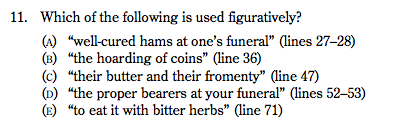
Example 2: Interpreting

#4: Literary Technique
These questions involve identifying why an author does what they do , from using a particular phrase to repeating certain words. Basically, what techniques is the author using to construct the passage/poem, and to what effect?
You can identify these questions by words/phrases such as "serves chiefly to," "effect," "evoke," and "in order to." A good way to approach these questions is to ask yourself: so what? Why did the author use these particular words or this particular structure?

#5: Character Analysis
These questions ask you to describe something about a character . You can spot them because they will refer directly to characters' attitudes, opinions, beliefs, or relationships with other characters .
This is, in many ways, a special kind of inference question , since you are inferring the broader personality of the character based on the evidence in a passage. Also, these crop up much more commonly for prose passages than they do for poetry ones.

#6: Overall Passage Questions
Some questions ask you to identify or describe something about the passage or poem as a whole : its purpose, tone, genre, etc. You can identify these by phrases such as "in the passage" and "as a whole."
To answer these questions, you need to think about the excerpt with a bird's-eye view . What is the overall picture created by all the tiny details?

#7: Structure
Some AP Lit questions will ask you about specific structural elements of the passage: a shift in tone, a digression, the specific form of a poem, etc . Often these questions will specify a part of the passage/poem and ask you to identify what that part is accomplishing.
Being able to identify and understand the significance of any shifts —structural, tonal, in genre, and so on—will be of key importance for these questions.

#8: Grammar/Nuts & Bolts
Very occasionally you will be asked a specific grammar question , such as what word an adjective is modifying. I'd also include in this category super-specific questions such as those that ask about the meter of a poem (e.g., iambic pentameter).
These questions are less about literary artistry and more about the fairly dry technique involved in having a fluent command of the English language .
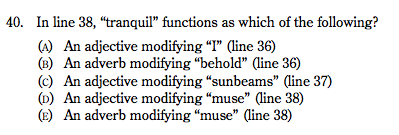
That covers the eight question types on the multiple-choice section. Now, let's take a look at the free-response section of the AP Literature exam.
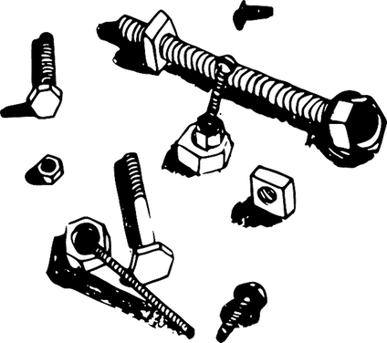
Keep track of the nuts and bolts of grammar.
Section II: Free Response
The AP Literature Free Response section is two hours long and involves three free-response essay questions , so you'll have about 40 minutes per essay. That's not a lot of time considering this section of the test counts for 55% of your overall exam grade !
Note, though, that no one will prompt you to move from essay to essay, so you can theoretically divide up the time however you want. Just be sure to leave enough time for each essay! Skipping an essay, or running out of time so you have to rush through one, can really impact your final test score.
The first two essays are literary analysis essays of specific passages, with one poem and one prose excerpt. The final essay is an analysis of a given theme in a work selected by you , the student.
Essays 1 & 2: Literary Passage Analysis
For the first two essays, you'll be presented with an excerpt and directed to analyze the excerpt for a given theme, device, or development . One of the passages will be poetry, and one will be prose. You will be provided with the author of the work, the approximate date, and some orienting information (i.e., the plot context of an excerpt from a novel).
Below are some sample questions from the 2022 Free Response Questions .

Essay 3: Thematic Analysis
For the third and final essay, you'll be asked to discuss a particular theme in a work that you select . You will be provided with a list of notable works that address the given theme below the prompt, but you can also choose to discuss any "work of literary merit."
So while you do have the power to choose which work you wish to write an essay about , the key words here are "literary merit." That means no genre fiction! Stick to safe bets like authors in the list on pages 10-11 of the old 2014 AP Lit Course Description .
(I know, I know—lots of genre fiction works do have literary merit and Shakespeare actually began as low culture, and so on and so forth. Indeed, you might find academic designations of "literary merit" elitist and problematic, but the time to rage against the literary establishment is not your AP Lit test! Save it for a really, really good college admissions essay instead .)
Here's a sample question from 2022:
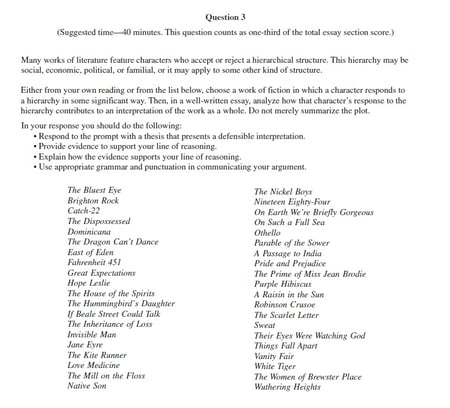
As you can see, the list of works provided spans many time periods and countries : there are ancient Greek plays ( Antigone ), modern literary works (such as Margaret Atwood's The Handmaid's Tale ), Shakespeare plays ( The Tempest ), 19th-century English plays ( The Importance of Being Earnest ), etc. So you have a lot to work with!
Also note that you can choose a work of "comparable literary merit." That means you can select a work not on this list as long as it's as difficult and meaningful as the example titles you've been given. So for example, Jane Eyre or East of Eden would be great choices, but Twilight or The Hunger Games would not.
Our advice? If you're not sure what a work of "comparable literary merit" is, stick to the titles on the provided list .
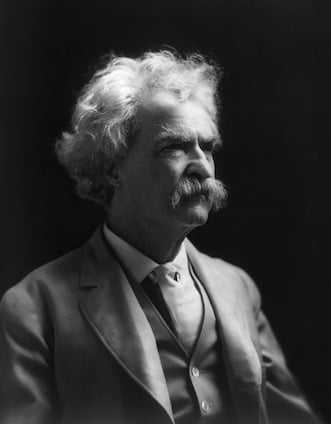
You might even see something by this guy.
How Is the AP Literature Test Graded?
The multiple-choice section of the exam comprises 45% of your total exam score; the three essays, or free-response section, comprise the other 55%. Each essay, then, is worth about 18% of your grade.
As on other AP exams, your raw score will be converted to a score from 1-5 . You don't have to get every point possible to get a 5 by any means. In 2022, 16.9% of students received 5s on the AP English Literature test, the 14th highest 5 score out of the 38 different AP exams.
So, how do you calculate your raw scores?
Multiple-Choice Scoring
For the multiple-choice section, you receive 1 point for each question you answer correctly . There's no guessing penalty, so you should answer every question—but guess only after you're able to eliminate any answer you know is wrong to up your chances of choosing the right one.
Free-Response Scoring
Scoring for multiple choice is pretty straightforward; however, essay scoring is a little more complicated.
Each of your essays will receive a score from 0 to 6 based on the College Board rubric , which also includes question-specific rubrics. All the rubrics are very similar, with only minor differences between them.
Each essay rubric has three elements you'll be graded on:
- Thesis (0-1 points)
- Evidence and Commentary (0-4 points)
- Sophistication (0-1 points)
We'll be looking at the current rubric for the AP Lit exam , which was released in September 2019, and what every score means for each of the three elements above:
To get a high-scoring essay in the 5-6 point range, you'll need to not only come up with an original and intriguing argument that you thoroughly support with textual evidence, but you’ll also need to stay focused, organized, and clear. And all in just 40 minutes per essay!
If getting a high score on this section sounds like a tall order, that's because it is.

Practice makes perfect!

Skill-Building for Success on the AP Literature Exam
There are several things you can do to hone your skills and best prepare for the AP Lit exam.
Read Some Books, Maybe More Than Once
One of the most important steps you can take to prepare for the AP Literature and Composition exam is to read a lot and read well . You'll be reading a wide variety of notable literary works in your AP English Literature course, but additional reading will help you further develop your analytical reading skills .
I suggest checking out this list of notable authors in the 2014 AP Lit Course Description (pages 10-11).
In addition to reading broadly, you'll want to become especially familiar with the details of four to five books with different themes so you'll be prepared to write a strong student-choice essay. You should know the plot, themes, characters, and structural details of these books inside and out.
See my AP English Literature Reading List for more guidance.
Read (and Interpret) Poetry
One thing students might not do very much on their own time but that will help a lot with AP Lit exam prep is to read poetry. Try to read poems from a lot of eras and authors to get familiar with the language.
We know that poetry can be intimidating. That's why we've put together a bunch of guides to help you crack the poetry code (so to speak). You can learn more about poetic devices —like imagery and i ambic pentameter —in our comprehensive guide. Then you can see those analytical skills in action in our expert analysis of " Do not go gentle into that good night " by Dylan Thomas.
When you think you have a grip on basic comprehension, you can then move on to close reading (see below).
Hone Your Close Reading and Analysis Skills
Your AP class will likely focus heavily on close reading and analysis of prose and poetry, but extra practice won't hurt you. Close reading is the ability to identify which techniques the author is using and why. You'll need to be able to do this both to gather evidence for original arguments on the free-response questions and to answer analytical multiple-choice questions.
Here are some helpful close reading resources for prose :
- University of Wisconsin-Madison Writing Center's guide to close reading
- Harvard College Writing Center's close reading guide
- Purdue OWL's article on steering clear of close reading "pitfalls"
And here are some for poetry :
- University of Wisconsin-Madison's poetry-reading guide
- This guide to reading poetry at Poets.org (complete with two poetry close readings)
- Our own expert analyses of famous poems, such as " Ozymandias ", and the 10 famous sonnets you should know
Learn Literary and Poetic Devices
You'll want to be familiar with literary terms so that any test questions that ask about them will make sense to you. Again, you'll probably learn most of these in class, but it doesn't hurt to brush up on them.
Here are some comprehensive lists of literary terms with definitions :
- The 31 Literary Devices You Must Know
- The 20 Poetic Devices You Must Know
- The 9 Literary Elements You'll Find In Every Story
- What Is Imagery?
- Understanding Assonance
- What Is Iambic Pentameter in Poetry?
- Simile vs Metaphor: The 1 Big Difference
- 10 Personification Examples in Poetry, Literature, and More
Practice Writing Essays
The majority of your grade on the AP English Lit exam comes from essays, so it's critical that you practice your timed essay-writing skills . You of course should use the College Board's released free-response questions to practice writing complete timed essays of each type, but you can also practice quickly outlining thorough essays that are well supported with textual evidence.
Take Practice Tests
Taking practice tests is a great way to prepare for the exam. It will help you get familiar with the exam format and overall experience . You can get sample questions from the Course and Exam Description , the College Board website , and our guide to AP English Lit practice test resources .
Be aware that the released exams don't have complete slates of free-response questions, so you might need to supplement these with released free-response questions .
Since there are three complete released exams, you can take one toward the beginning of your prep time to get familiar with the exam and set a benchmark, and one toward the end to make sure the experience is fresh in your mind and to check your progress.

Don't wander like a lonely cloud through your AP Lit prep.
AP Literature: 6 Critical Test-Day Tips
Before we wrap up, here are my six top tips for AP Lit test day:
- #1: On the multiple-choice section, it's to your advantage to answer every question. If you eliminate all the answers you know are wrong before guessing, you'll raise your chances of guessing the correct one.
- #2: Don't rely on your memory of the passage when answering multiple-choice questions (or when writing essays, for that matter). Look back at the passage!
- #3: Interact with the text : circle, mark, underline, make notes—whatever floats your boat. This will help you retain information and actively engage with the passage.
- #4: This was mentioned above, but it's critical that you know four to five books well for the student-choice essay . You'll want to know all the characters, the plot, the themes, and any major devices or motifs the author uses throughout.
- #5: Be sure to plan out your essays! Organization and focus are critical for high-scoring AP Literature essays. An outline will take you a few minutes, but it will help your writing process go much faster.
- #6: Manage your time on essays closely. One strategy is to start with the essay you think will be the easiest to write. This way you'll be able to get through it while thinking about the other two essays.

And don't forget to eat breakfast! Apron optional.
AP Literature Exam: Key Takeaways
The AP Literature exam is a three-hour test that includes an hour-long multiple-choice section based on five prose and poetry passages and with 55 questions, and a two-hour free-response section with three essays : one analyzing a poetry passage, one analyzing a prose passage, and one analyzing a work chosen by you, the student.
The multiple-choice section is worth 45% of your total score , and the free-response section is worth 55% . The three essays are each scored on a rubric of 0-6, and raw scores are converted to a final scaled score from 1 to 5.
Here are some things you can do to prepare for the exam:
- Read books and be particularly familiar with four to five works for the student-choice essays
- Read poetry
- Work on your close reading and analysis skills
- Learn common literary devices
- Practice writing essays
- Take practice tests!
On test day, be sure to really look closely at all the passages and really interact with them by marking the text in a way that makes sense to you. This will help on both multiple-choice questions and the free-response essays. You should also outline your essays before you write them.
With all this in mind, you're well on your way to AP Lit success!
What's Next?
If you're taking other AP exams this year, you might be interested in our other AP resources: from the Ultimate Guide to the US History Exam , to the Ultimate AP Chemistry Study Guide , to the Best AP Psychology Study Guide , we have tons of articles on AP courses and exams for you !
Looking for practice exams? Here are some tips on how to find the best AP practice tests . We've also got comprehensive lists of practice tests for AP Psychology , AP Biology , AP Chemistry , and AP US History .
Deciding which APs to take? Take a look through the complete list of AP courses and tests , read our analysis of which AP classes are the hardest and easiest , and learn how many AP classes you should take .

Ellen has extensive education mentorship experience and is deeply committed to helping students succeed in all areas of life. She received a BA from Harvard in Folklore and Mythology and is currently pursuing graduate studies at Columbia University.
Student and Parent Forum
Our new student and parent forum, at ExpertHub.PrepScholar.com , allow you to interact with your peers and the PrepScholar staff. See how other students and parents are navigating high school, college, and the college admissions process. Ask questions; get answers.

Ask a Question Below
Have any questions about this article or other topics? Ask below and we'll reply!
Improve With Our Famous Guides
- For All Students
The 5 Strategies You Must Be Using to Improve 160+ SAT Points
How to Get a Perfect 1600, by a Perfect Scorer
Series: How to Get 800 on Each SAT Section:
Score 800 on SAT Math
Score 800 on SAT Reading
Score 800 on SAT Writing
Series: How to Get to 600 on Each SAT Section:
Score 600 on SAT Math
Score 600 on SAT Reading
Score 600 on SAT Writing
Free Complete Official SAT Practice Tests
What SAT Target Score Should You Be Aiming For?
15 Strategies to Improve Your SAT Essay
The 5 Strategies You Must Be Using to Improve 4+ ACT Points
How to Get a Perfect 36 ACT, by a Perfect Scorer
Series: How to Get 36 on Each ACT Section:
36 on ACT English
36 on ACT Math
36 on ACT Reading
36 on ACT Science
Series: How to Get to 24 on Each ACT Section:
24 on ACT English
24 on ACT Math
24 on ACT Reading
24 on ACT Science
What ACT target score should you be aiming for?
ACT Vocabulary You Must Know
ACT Writing: 15 Tips to Raise Your Essay Score
How to Get Into Harvard and the Ivy League
How to Get a Perfect 4.0 GPA
How to Write an Amazing College Essay
What Exactly Are Colleges Looking For?
Is the ACT easier than the SAT? A Comprehensive Guide
Should you retake your SAT or ACT?
When should you take the SAT or ACT?
Stay Informed
Get the latest articles and test prep tips!
Looking for Graduate School Test Prep?
Check out our top-rated graduate blogs here:
GRE Online Prep Blog
GMAT Online Prep Blog
TOEFL Online Prep Blog
Holly R. "I am absolutely overjoyed and cannot thank you enough for helping me!”
AP English Literature & Composition
Ap english literature.
Use the menu above to get started with the best AP English Literature practice exams, free response questions, vocabulary quizzes, and study guides. There are some amazing free online resources available for your test prep and review.
AP English Literature & Composition Exam
The AP English Literature and Composition course focuses on both the reading of literature and writing about it. The reading assignments cover a variety of genres and time periods and students should engage in the critical analysis of each text. The writing focuses on the experience, evaluation, and interpretation of the literature.
The AP English Literature Exam format is:
Multiple-Choice Section -60 minutes -45% of final grade -55 multiple choice questions
Free-Response Section -120 minutes -55% of final grade -3 essay questions:
- Literary analysis of a given poem
- Literary analysis of a given passage of prose fiction
- Literary analysis that examines a specific concept, issue, or element in a literary work that you select
When is the AP English Literature Exam?
The AP English Literature and Composition Exam date for the 2022–2023 school year is Wednesday, May 3, 2023 at 8 a.m . The test is only offered once per year.
AP English Literature | Practice Exams | Free Response | Vocab | Study Guides
Calculate for all schools
Your chance of acceptance, your chancing factors, extracurriculars, ap lit exam breakdown – what to expect.
Hey there! I was wondering if anyone can help me understand the AP Lit exam breakdown – what types of questions are there, how much time I'll have, etc. Basically, I want to know what to expect so I can be fully prepared! Thanks in advance!
Hello! It's smart to familiarize yourself with the AP Lit exam format in order to be best prepared. The AP Literature and Composition exam consists of two sections: multiple-choice and free-response. Here is a breakdown of what you can expect for each section:
Section 1: Multiple-Choice
- Number of Questions: 55
- Time: 60 minutes
- Weight: 45% of your total score
In this section, you'll have approximately a minute per question to answer questions about passages of prose and poetry. These passages can be from any time period, from the 16th century up to contemporary literature. You'll be asked to analyze various aspects of the writing, such as the plot, theme, style, character development, figurative language, and more.
Section 2: Free-Response
- Number of Questions: 3
- Time: 120 minutes
- Weight: 55% of your total score
This section is composed of three essay prompts:
1. Poetry Analysis: You'll analyze a poem's literary elements, such as theme, symbolism, imagery, and more.
2. Prose Fiction Analysis: You'll analyze a passage from a work of fiction (which can be a short story or a novel excerpt), with a focus on elements like character development, narrative techniques, theme, etc.
3. Literary Argument: For this essay, you can choose from a list of given topics, and you'll develop an argument about a specific work of literature that you've previously read. This work can be from the suggested list provided or any other work of comparable literary merit.
For the free-response section, you'll have a total of 120 minutes, which gives you about 40 minutes per essay. However, remember to allocate some time for reading and analyzing the provided passages, outlining your responses, and reviewing your essays before submitting them.
While studying for the AP Lit exam, it's essential to practice both multiple-choice and free-response questions, and to ensure you're comfortable exploring a variety of literary genres and periods. Focus on honing your analytical skills, your knowledge of literary terms, and your ability to construct clear and compelling arguments in your essays.
Finally, for an even more comprehensive breakdown of what you can expect on this exam, and how to earn a high score, check out this blog post from CollegeVine: https://blog.collegevine.com/ultimate-guide-to-the-english-literature-and-composition-ap-exam/. Good luck!
About CollegeVine’s Expert FAQ
CollegeVine’s Q&A seeks to offer informed perspectives on commonly asked admissions questions. Every answer is refined and validated by our team of admissions experts to ensure it resonates with trusted knowledge in the field.

IMAGES
VIDEO
COMMENTS
Download free-response questions from past exams along with scoring guidelines, sample responses from exam takers, and scoring distributions. If you are using assistive technology and need help accessing these PDFs in another format, contact Services for Students with Disabilities at 212-713-8333 or by email at [email protected].
MsEffie's List of Open-ended Questions. for Advanced Placement® English Literature Exams, 1970-2023. Do not merely summarize the plot. Avoid plot summary. 2023, Set 1. In many works of literature, characters choose to reinvent themselves for significant reasons. They may wish to separate from a previous identity, gain access to a different ...
Question 1. (Suggested time—40 minutes. This question counts as one-third of the total essay section score.) Carefully read P. K. Page's 1943 poem "The Landlady.". Then, in a well-organized essay, analyze the speaker's complex portrayal of the landlady. You may wish to consider such elements as imagery, selection of detail, and tone.
Barron's AP English Literature and Composition, 7th Edition. Like The Princeton Review study guide, the Barron's AP Literature study guide is another great resource for students looking for extra exam prep. This guide has four practice tests and sample essay questions, along with an expert walk-through of the AP Literature exam itself.
All FRQ #3 Open-Ended Prompts, 1970-2022. All of the Individual Prompts. Thanks to the hard work of Sandra Effinger, all the open-ended prompts from 1970-2022 have been assembled on one page. Please see this link. All of the Prompts Condensed into One Page. This is incredibly useful as a way of building general questions about independent reading.
Question 1. (Suggested time—40 minutes. This question counts as one-third of the total essay section score.) Read carefully the following poem by Marilyn Nelson Waniek. Then write an essay analyzing how Waniek employs literary techniques to develop the complex meanings that the speaker attributes to The Century Quilt.
The AP English Literature and Composition Exam is 3 hours long and broken up into two sections. Section I (One hour) 45 percent of total score 55 multiple-choice questions based on 2 or 3 poems and 2 or 3 passages of fiction. Section II (Two hours) 55 percent of total score 3 essays. Essay 1: An analysis of a poem.
The AP Literature Exam is a three-hour exam that contains two sections in this order: An hour-long, 55-question multiple-choice section. A two-hour, three-question free-response section. The exam tests your ability to analyze works and excerpts of literature and cogently communicate that analysis in essay form.
This is the official AP English Literature practice exam that was released by the College Board in 2012. A valuable resource for test prep that will give you practice with real AP questions. ... There are 46 AP Literature multiple choice questions in the College Board course description on pages 12 to 27. Also includes sample free response ...
ENGLISH LITERATURE AND COMPOSITION SECTION II Total time—2 hours Question 1 (Suggested time—40 minutes. This question counts as one-third of the total essay section score.) In the following speech from Shakespeare's play Henry VIII, Cardinal Wolsey considers his sudden downfall from his position as advisor to the king.
The AP English Literature Exam format is: Multiple-Choice Section-60 minutes-45% of final grade-55 multiple choice questions. Free-Response Section-120 minutes-55% of final grade-3 essay questions: Literary analysis of a given poem; Literary analysis of a given passage of prose fiction; Literary analysis that examines a specific concept, issue ...
400+ Exam-Like Questions. Realistic questions mimic the style and difficulty of the AP English Literature exam. Organized in the same way as the AP Lit course, so you learn as you go, all year long. Prepares you to excel on quizzes, unit tests, and the AP exam.
Download free-response questions from past exams along with scoring guidelines, sample responses from exam takers, and scoring distributions. If you are using assistive technology and need help accessing these PDFs in another format, contact Services for Students with Disabilities at 212-713-8333 or by email at [email protected]. Note ...
2. The following passage is from D. H. Lawrence's 1915 novel, The Rainbow, which focuses on the lives of the Brangwens, a farming family who lived in rural England during the late nineteenth century. Read the passage carefully. Then write an essay in which you analyze how Lawrence employs literary devices to characterize the woman and capture ...
Hello! It's smart to familiarize yourself with the AP Lit exam format in order to be best prepared. The AP Literature and Composition exam consists of two sections: multiple-choice and free-response. Here is a breakdown of what you can expect for each section: Section 1: Multiple-Choice - Number of Questions: 55 - Time: 60 minutes - Weight: 45% of your total score In this section, you'll have ...
AP English Literature and Composition 2022 Free-Response Questions Author: ETS Subject: Free-Response Questions from the 2022 AP English Literature and Composition Exam Keywords: English Literature and Composition; Free-Response Questions; 2022; exam resources; exam information; teaching resources; exam practice Created Date: 10/19/2021 1:40:00 PM
Question 1. (Suggested time—40 minutes. This question counts as one-third of the total essay section score.) The poems below, published in 1789 and 1794, were written by William Blake in response to the condition of chimney sweeps. Usually small children, sweeps were forced inside chimneys to clean their interiors.